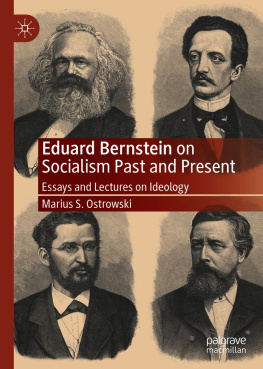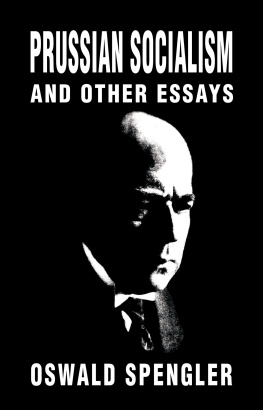Marius S. Ostrowski
Eduard Bernstein on Socialism Past and Present
Essays and Lectures on Ideology
1st ed. 2021

Logo of the publisher
Marius S. Ostrowski
All Souls College, Oxford, UK
ISBN 978-3-030-50483-0 e-ISBN 978-3-030-50484-7
https://doi.org/10.1007/978-3-030-50484-7
The Editor(s) (if applicable) and The Author(s) 2021
This work is subject to copyright. All rights are solely and exclusively licensed by the Publisher, whether the whole or part of the material is concerned, specifically the rights of translation, reprinting, reuse of illustrations, recitation, broadcasting, reproduction on microfilms or in any other physical way, and transmission or information storage and retrieval, electronic adaptation, computer software, or by similar or dissimilar methodology now known or hereafter developed.
The use of general descriptive names, registered names, trademarks, service marks, etc. in this publication does not imply, even in the absence of a specific statement, that such names are exempt from the relevant protective laws and regulations and therefore free for general use.
The publisher, the authors and the editors are safe to assume that the advice and information in this book are believed to be true and accurate at the date of publication. Neither the publisher nor the authors or the editors give a warranty, expressed or implied, with respect to the material contained herein or for any errors or omissions that may have been made. The publisher remains neutral with regard to jurisdictional claims in published maps and institutional affiliations.
Cover credit for the FM: The Print Collector / Alamy Stock Photo
This Palgrave Macmillan imprint is published by the registered company Springer Nature Switzerland AG.
The registered company address is: Gewerbestrasse 11, 6330 Cham, Switzerland
Contents
Marius S. Ostrowski
Part ISocialism Past and Present: Historical and Contemporary Disputes Within Socialism
Part IIWritings on Ideology and Socialist Theory
Part IIISelected Articles
The Author(s) 2021
M. S. Ostrowski Eduard Bernstein on Socialism Past and Present https://doi.org/10.1007/978-3-030-50484-7_1
1. Introduction
Marius S. Ostrowski
(1)
All Souls College, Oxford, UK
Marius S. Ostrowski
Email:
By the turn of the twentieth century, the socialist movement and its governing ideology were being forced to confront an increasingly drastic challenge to their social claims and ambitions. Yet prima facie, the course of the movements development in the latter half of the nineteenth century offered ample grounds for hope and optimism about its future prospects. The story of socialism in this period is one of at times seemingly miraculous survivalendurance, recovery, and even flourishing in the face of a relentless barrage of obstacles and setbacks. By any measure, the period began in the most inauspicious possible way. The crushing defeat of the 18481849 revolutions in Western and Central Europein which socialists, communists , and other radicals found themselves and their demands marginalised by republicans, liberals , and nationalists of a bourgeois stripewas swiftly followed by the counter-revolutionary reaction of the 1850s, in which socialists bore the brunt of heightened police repression, curtailment of rights , and strict censorship. Yet by the 1860s, the socialist movement had steadily increased in size and organisation, first at a regional, then at a national level. The rise of an urban industrial working class created new demands for better work and living conditions that the existing system of guilds and fraternal societies was ill-equipped to manage, leading to the proliferation of labour councils, forerunners of modern trade unions, first in Britain and then across the Continent. Increasingly durable socialist papers and societies sprang up to act as forums for progressive debate. With the gradual spread of electoral democracy across Europe, workers parties formed in opposition not only to aristocratic and clerical conservatism, but also to perceived insufficiencies in the reformist efforts of liberals and radicals.
By the 1860s, out of a disparate collection of largely isolated agitators and sect-like clubs, a broad coalition of groups had arisen encompassing varying currents of ideas and interestsfrom labour activists to democratic franchise reformers, from utopian experimenters to advocates of cooperative mutualism. Initially, all of them were united under a shared socialist banner, as the pragmatic need to cooperate to survive outweighed finer points of ideological difference. But this was never a stable or lasting situation, and disputes over socialisms assumptions and aims soon led to rifts within the coalitionperhaps most dramatically, the split between mutualists and statists that caused the demise of the first effort at socialist internationalism, the International Workingmens Association (18641876). The rest of the century was marked by socialisms steady consolidation into a more clearly-defined construct. The initial diversity of socialist currents was reduced to something akin to an ideological oligopoly, dominated by Marxism , the current of thought developed by the German socialists Karl Marx and Friedrich Engels , alongside a number of smaller strands. The movement also refined its view of society and programme of demands, re-establishing its international presence in the form of the Second International (18891914), whose early congresses adopted resolutions on improving labour conditions, womens rights , agrarian policy, strike action, and opposition to militarism.
This process went hand-in-hand with its ascent to ever greater societal prominence on several fronts. Despite the best efforts of several decades of repressionincluding long-standing bans on trade union and partisan organisationEuropean governments were increasingly forced to concede the legitimacy of socialist activism. National trade union centres emerged in Britain in 1868, Germany in 1892, France in 1895, and Scandinavia in 18981899. Aided by incremental franchise extensions, socialist parties began to win parliamentary representation: for the first time in Germany in 1871, France in 1881, the Netherlands in 1888, Belgium in 1890, Italy in 1895, and Britain in 1900. By the start of the twentieth century, they were attracting nearly 5 million votes in total across Europe, and as much as 2030% of the vote in countries such as Austria, Belgium, and above all Germany .
Socialism at the turn of the century, then, was by any standard an ideology on the rise. It is difficult to overstate the extent to which its ideological insurgency fundamentally and irrevocably reshaped the contours of society. Simply put, the legacy of socialism was to inaugurate a new chapter in the treatment of the socialin theoretical understandings of the constitution and driving forces of society, and in the practical manifestation of societys interests and needs. From a disciplinary viewpoint, it radically reoriented the perspective of political economy, and integrated it with insights from the philosophy of history to provide a new analysis of society and of production as the dynamo that underpins societal development. In its emphasis on the scientific method and reliance on empirical-inductive reasoning, experiential proof, and evidence from statistics, history, and ethnology, it instigated a significant leap forward in the













